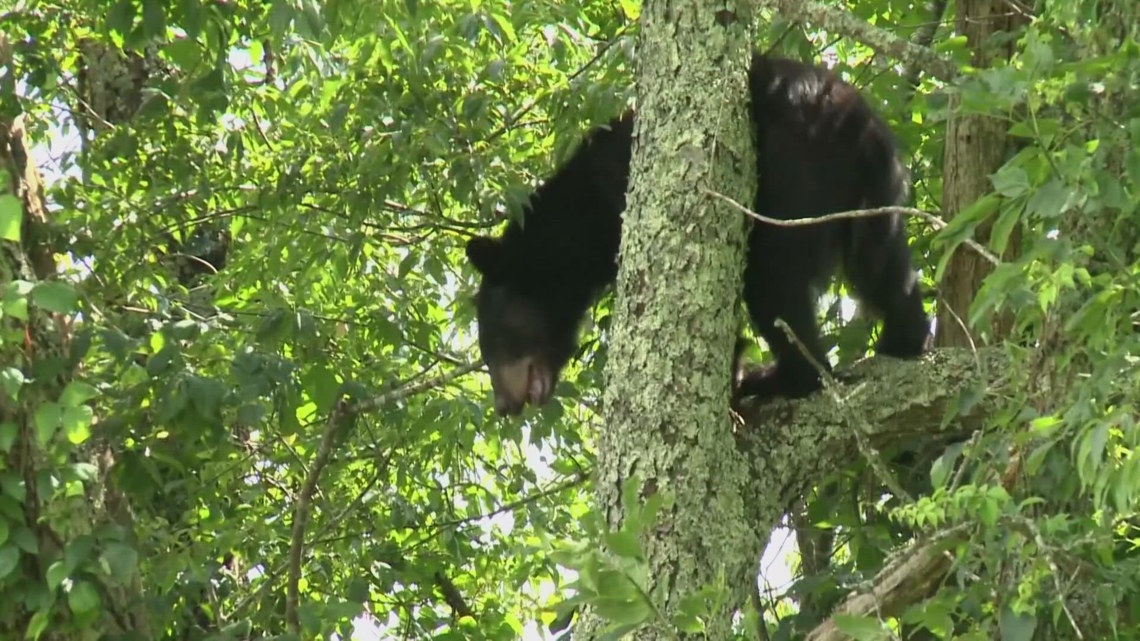
The woman did not have any injuries or bite marks, according to the Tennessee Wildlife Resources Agency.
SEVIER COUNTY, Tenn. — Three bears are dead after wildlife resources officers said they received a report about a woman being bitten and dragged from a porch by a black bear Thursday evening.
The Tennessee Wildlife Resources Agency said it received the report at around 7:41 p.m. and officers immediately responded. When they arrived, officers said they found a yearling bear inside a trap set after a previous incident, in which a bear totaled a vehicle while breaking into it. The TWRA said there were groceries inside the vehicle at the time.
After finding the yearling bear in the trap, officers said they encountered an adult female bear and another yearling. A release from the TWRA said due to their behavior and their “level of habituation and food condition,” both were “lethally removed” because they posed a risk to public safety. The TWRA said the bear in the trap was also humanely killed, following wildlife management protocols.
Emergency medical services evaluated the woman and determined she did not have any injuries or bite marks.
TWRA spokesperson Matt Cameron said they are not pursuing any charges to the woman involved in the incident at the time of our request on April 18th. While the woman had no apparent injuries, they cannot determine if or if not an attack occurred.
“However, the level of risk posed by these bears was significant. These animals had become food-conditioned and habituated to human presence, resulting in repeated property damage and increasingly bold behavior, including entering vehicles and, ultimately, this human encounter,” the TWRA said in a release.
Greg Grieco, the Director of Operations at Appalachian Bear Rescue, said unfortunately, the area where the incident happened, right off of Norton Creek Road, sees similar incidents frequently.
“This area is just outside of Gatlinburg, just off the spur, a couple miles from park land,” Grieco said. “These bears in this area get euthanized for similar things every single year.”
One problem, Grieco said, is because the incident happened outside of Gatlinburg city limits, there is no penalty for leaving trash or food available for bears. Fees can be up to $200.
There are laws that prohibit people from feeding bears or leaving trash unsecured in Gatlinburg city limits, the National Park, and National Forests. Grieco said all places where bears might be, should have the same law.
“If we had one law across the state that they could all follow and enforce, it would make things a lot easier,” Grieco said. “Hopefully we get better compliance out of people in these areas that are in the county, but still in the doorstep of our national park.”
It said that according to the agency’s Human-Bear Conflict Matrix protocol, bears that display these kinds of behavior are considered a public safety concern. When they display behaviors like this, the agency said it cannot relocate them, especially in cases involving food conditioning and vehicle break-ins.
“These decisions are never made lightly, and we understand the public’s concern. Our priority is always to ensure the safety of both people and wildlife, and we remain committed to proactive measures to reduce bear conflicts in our communities,” the TWRA said.
WBIR requested the number of bears euthanized by the TWRA. In 2024, a total of 65 bears were killed for a variety of reasons. 32 of them were ‘humanely killed’ due to their behavior around humans. In addition, 20 were ‘euthanized’ due to injury or illness, most likely from being hit by a car. And in the winter of 2024, 13 bears were put down from Appalachian Bear Rescue due to illness.
TWRA said this year, a total of six bears were killed, as of April 18th. Three were due to illness or injury, and the other three were from this incident.
Grieco said, as one of the land’s most precious resources, there is more people and lawmakers can do to protect bears.
“We’re supposed to care about bears, but we have more bear conflict than anywhere else in the country in this area,” he said. “It results in detriment to our bears. So we love our bears, but we don’t love them enough to pass some laws to help them.”
It also encouraged anyone living in areas known for having bear populations to be proactive and follow the “At Home Checklist” from the BearWise website. The steps on the checklist include removing bird feeders while bears are active, securing garbage and never feeding bears.
